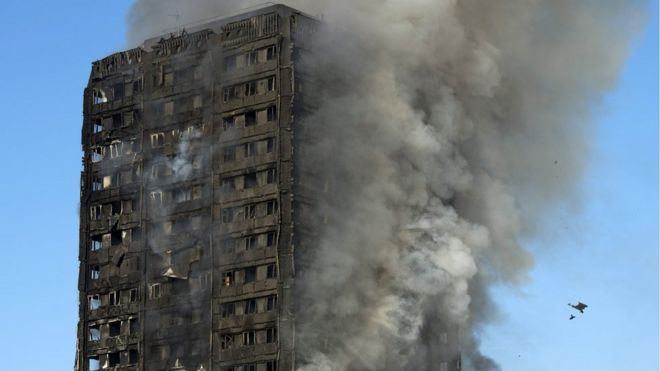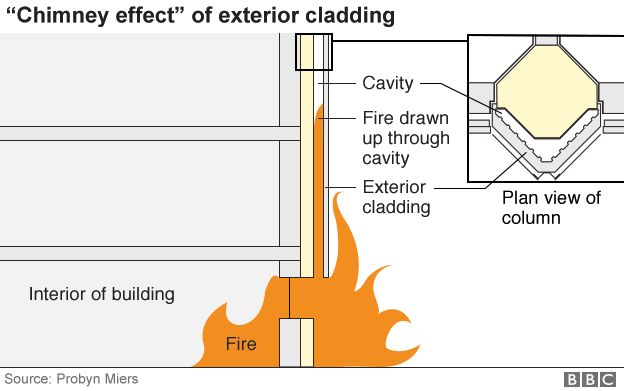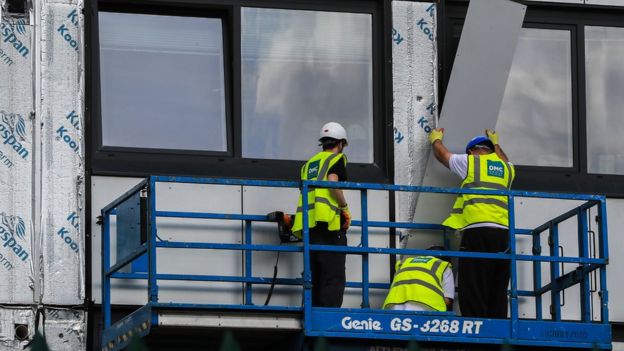Monday 26.06.17..These are external links and will open in a new window
 Image copyright EPA
Image copyright EPA The US firm that supplied cladding used on London’s Grenfell Tower says it has ended global sales of the product for use in high-rise blocks.
Arconic said it was discontinuing sales of Reynobond PE for tower blocks due to “issues” identified by the fire, which is feared to have killed at least 79.
The government said 75 buildings in 26 council areas had now failed fire safety tests – every one tested so far.
Theresa May said councils need to speed up tower block safety tests in England.
Communities and Local Government Secretary Sajid Javid said all hospitals and schools had also been asked to carry out “immediate checks”.
He said the fact all tested samples had failed the so-called combustibility test underlined the “vital importance of submitting samples urgently”.
“The testing facility can analyse 100 samples a day and runs around the clock. I am concerned at the speed at which samples are being submitted.
“I would urge all landlords to submit their samples immediately,” Mr Javid told the House of Commons.

Four more Grenfell fire victims’ inquests have been opened and adjourned, including that of a boy aged five.
The body of Isaac Paulos, who lived with his family on the 18th floor, was found on the 13th floor, Westminster Coroner’s Court was told.
A preliminary cause of his death was given as “inhalation of fire fumes”.
The inquests of Mary Ajaoi Augustus Mendy, 54, her daughter Khadija Saye, 24, and Mohamednur Tuccu, 44, were also opened.
Questions about the cladding used on Grenfell Tower, in the London borough of Kensington and Chelsea, were raised in the days after the fire.
Engineering and manufacturing company Arconic later confirmed Reynobond PE (polyethylene) – an aluminium composite material – was “used as one component in the overall cladding system” of the block.
The material has a plastic core, which it is feared may have helped accelerate the spread of the fire.

In a fresh statement, the firm said it had stopped sales of Reynobond PE for tall buildings, citing concerns about the “inconsistency of building codes across the world”.
Following the Grenfell Tower fire, issues have arisen “regarding code compliance of cladding systems”, it added.
Cladding from as many as 600 tower blocks across England is being tested for safety.
Housing minister Alok Sharma told the BBC Radio 4’s Today Programme some councils were acting “very quickly”.
 Image copyright PA
Image copyright PA Mr Sharma added: “People should not wait for the checks to come back from these (tests).
“They should act now, get the fire service in, check the buildings that they think may be affected, put in place mitigation measures, if required, or, as in the case of Camden, if they need to evacuate, that needs to happen.”
Insulation and cladding taken from Grenfell Tower failed preliminary safety tests last week.
Staying put
Over the weekend, Camden Council moved to evacuate 650 flats from four tower blocks in the Swiss Cottage area, after London Fire Brigade had raised concerns about cladding, gas pipe insulation, and fire doors.
Some 103 households are currently refusing to leave the tower blocks, the BBC understands – an increase on Saturday when 83 households remained.
The apparent increase suggests some families have returned home since the weekend despite the warning.
Source BBC














